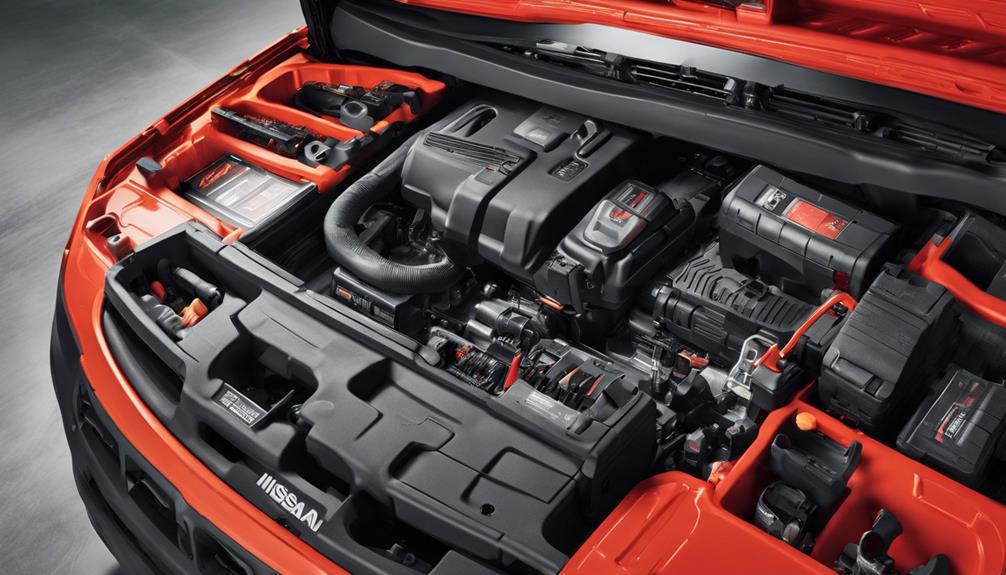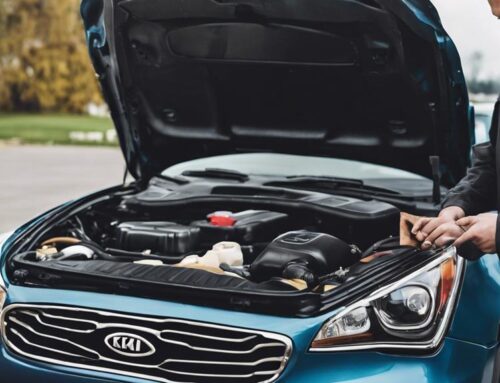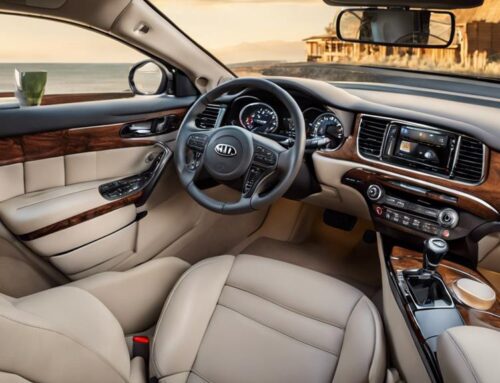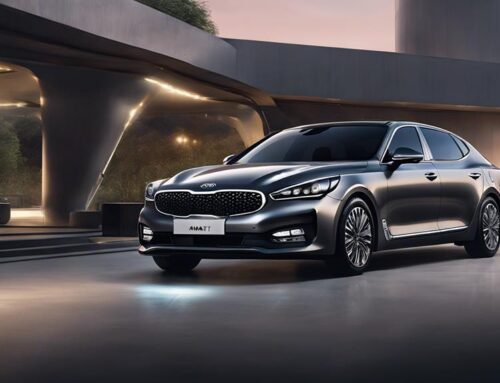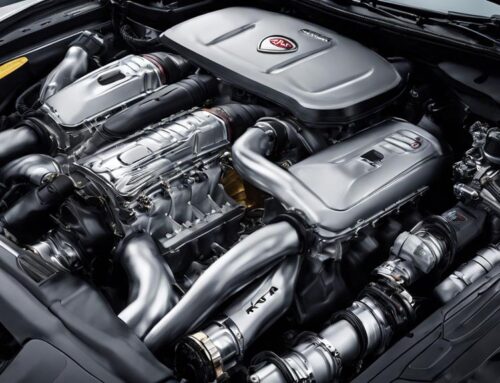Regular battery upkeep for your Nissan Titan guarantees peak performance and reliability. Check the terminals for corrosion, monitor fluid levels, and routinely test the voltage. A healthy battery is vital for efficient engine starts, dependable electrical systems, and driver-assistance functions. Be mindful of issues like corrosion, parasitic drains, and faulty alternators. To replace the battery, turn off the vehicle, disconnect the terminals, and remove clamps. Choose compatible, high-quality AGM or Lithium-Ion batteries. Maintain charge levels, inspect mounts, and avoid short trips. If you notice slow cranking or dim headlights, it's time to take action. Explore detailed steps and tips next.
Key Takeaways
- Regularly inspect battery terminals for corrosion and clean them to ensure optimal contact.
- Check and maintain proper battery fluid levels to avoid internal damage and extend battery life.
- Monitor battery voltage regularly to detect early signs of potential issues or failure.
- Ensure the battery is securely mounted to prevent vibrations and potential damage.
- Test the alternator's output periodically to confirm it's charging the battery correctly.
Importance of Battery Maintenance in Nissan Titan
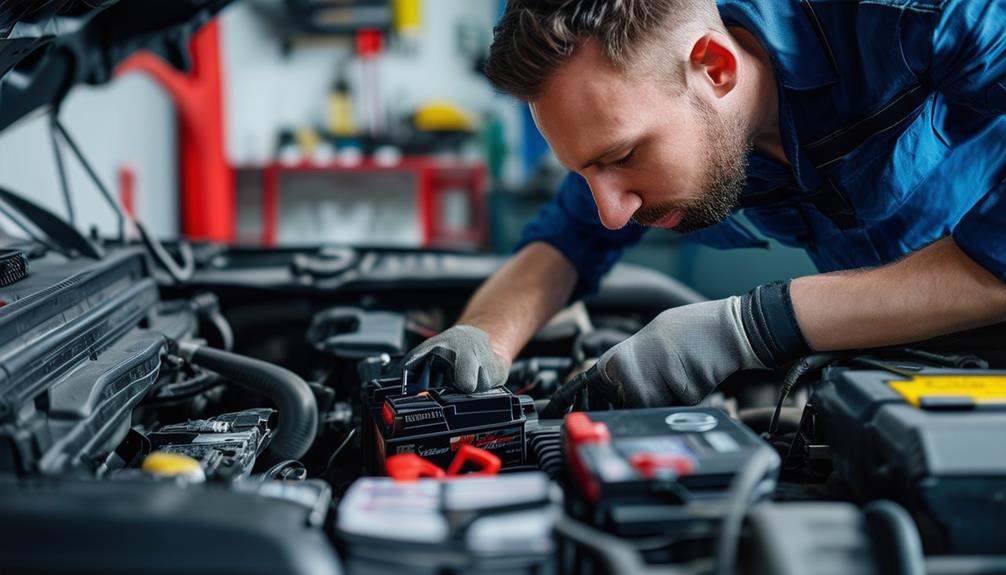
Regularly maintaining your Nissan Titan's battery is essential for guaranteeing peak vehicle performance and preventing unexpected breakdowns. By integrating a consistent maintenance routine, you can greatly enhance battery longevity and contribute to performance optimization. It's also important to understand the electrical components of the vehicle and how they interact with the battery.
Start by inspecting your battery terminals for any signs of corrosion. Corrosion can impede electrical conductivity and reduce efficiency. Use a wire brush and a mixture of baking soda and water to clean the terminals thoroughly. Make sure the connections are tight and free from debris to maintain the best electrical flow.
Next, check the battery fluid levels if applicable. Some Nissan Titan batteries are sealed and maintenance-free, but if yours isn't, remove the caps and make sure the fluid covers the lead plates completely. Use distilled water to top off if necessary, never tap water, as impurities can damage the battery.
Monitoring the voltage is another critical step. Use a multimeter to measure the battery's voltage. A fully charged battery should read around 12.6 volts or higher. If the reading is consistently below this, consider charging the battery or seeking professional evaluation to prevent degradation.
Temperature impacts battery performance significantly. In extreme weather conditions, both hot and cold, take extra precautions. During winter, make sure your battery is insulated, and in summer, check for overheating signs. Proactive temperature management can extend battery longevity and enhance vehicle performance.
Lastly, consider investing in a smart battery charger. These devices maintain the battery at an optimal charge level, preventing overcharging and undercharging, both detrimental to battery life. By adopting these maintenance practices, you're not just preserving battery longevity but also guaranteeing your Nissan Titan operates at its peak, ready for any adventure.
How Battery Health Affects Key Systems
The health of your Nissan Titan's battery directly impacts several key systems, supporting they function at their peak. A well-maintained battery enhances battery lifespan and performance, crucial for the efficient operation of your vehicle's essential components. If you're experiencing issues, it may be helpful to refer to a troubleshooting guide for specific advice on diagnosing and resolving battery-related problems.
First, consider the ignition system. A robust battery supports quick and reliable engine starts, reducing wear on the starter motor and ignition components. Without sufficient battery performance, you risk sluggish starts or even failures, compromising the reliability of your Titan.
Next, the electrical system relies heavily on battery health. This system encompasses everything from your headlights to your infotainment system. A deteriorating battery can't consistently supply the needed power, leading to dim lights, malfunctioning electronics, and potential safety hazards. Maintaining battery health supports consistent system functionality and reliability.
The fuel management system is another critical area impacted by battery condition. Your Titan's onboard computers, including the Engine Control Unit (ECU), depend on stable power from the battery. An unreliable battery can cause erratic fuel delivery, inefficient combustion, and decreased fuel economy, hampering overall vehicle performance.
Additionally, advanced driver-assistance systems (ADAS) like lane-keeping assist, adaptive cruise control, and collision avoidance require a dependable power source. These innovative systems enhance your driving experience and safety. Supporting your battery's health sustains their performance and reliability.
Lastly, climate control systems, including heating and air conditioning, draw significant power from the battery. A weak battery can lead to inconsistent cabin temperatures, impacting comfort and efficiency. In sum, your Nissan Titan's battery health is crucial for maintaining system functionality and reliability. Regular maintenance maximizes battery lifespan and supports all key systems operate seamlessly, backing your vehicle's innovative features and performance.
Common Battery Issues and Solutions
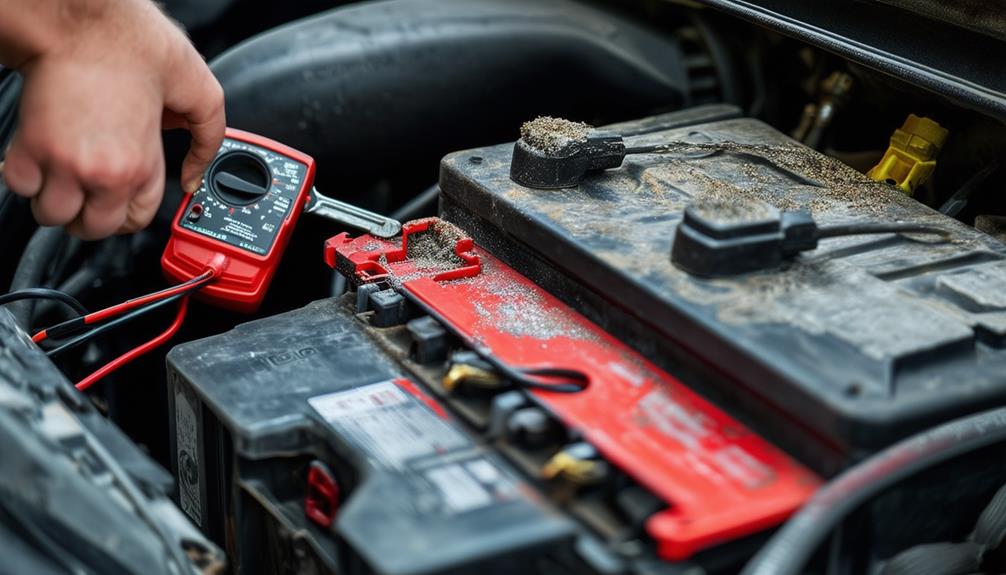
Encountering common battery issues in your Nissan Titan can be frustrating but solvable with the right approach. One frequent problem is a shortened battery lifespan. This can be due to factors like extreme temperatures, frequent short trips, or leaving electronics on when the engine is off. To maximize battery lifespan, ensure proper insulation in extreme weather and consider investing in a battery maintainer if you make many short trips. Regular battery inspections can also help, as they allow you to catch potential issues early.
For instance, inspecting your ignition systems and maintenance can reveal problems that might indirectly affect battery performance.
Another issue is improper charging techniques. Overcharging or undercharging your battery can reduce its efficiency. Use a smart battery charger that adjusts the charge rate based on the battery's condition. This not only prolongs battery lifespan but also ensures top-notch performance.
Corrosion on battery terminals is another common problem. Corrosion can impede electrical flow, causing starting issues. Regularly inspect and clean the terminals with a mixture of baking soda and water. Apply a thin layer of petroleum jelly to prevent future corrosion.
Parasitic drains are sneaky culprits that can deplete your battery overnight. Unplug any accessories and make sure all lights are off when the vehicle isn't in use. If the issue persists, you might need to diagnose the electrical system for hidden drains.
Lastly, if your battery frequently dies, it might be due to a failing alternator. The alternator is responsible for charging the battery while the engine runs. If it's faulty, the battery won't hold a charge. Test the alternator output with a multimeter, and replace it if necessary.
Steps to Check and Replace the Titan Battery
Addressing common battery issues is vital for maintaining your Nissan Titan's reliability. Let's walk through the steps to check and replace your Titan's battery efficiently. Consider upgrading to a more advanced security system while performing maintenance to enhance your vehicle's functionality.
First, confirm your vehicle is turned off and parked on a flat surface. Open the hood and locate the battery. Begin by checking the battery voltage using a multimeter. Connect the multimeter's positive lead to the battery's positive terminal and the negative lead to the negative terminal. A fully charged battery should read approximately 12.6 volts. If the reading is below 12.4 volts, your battery may need replacement.
Next, gather your tools: a wrench set, gloves, safety glasses, and a battery terminal cleaner. Disconnect the negative battery terminal first to prevent any electrical short circuits. Use a wrench to loosen the terminal nut and carefully remove the cable. Repeat the process for the positive terminal.
With both terminals disconnected, remove any securing brackets or clamps holding the battery in place. Lift the old battery out of the tray, ensuring you follow proper lifting techniques to avoid injury.
Before installing the new battery, clean the terminal clamps and battery tray with a battery terminal cleaner. Place the new battery in the tray, ensuring the terminals are correctly aligned (positive to positive, negative to negative). Secure the battery with the brackets or clamps you removed earlier.
Reconnect the positive terminal first, followed by the negative terminal. Tighten the terminal nuts securely, but avoid overtightening. To complete the process, start your Nissan Titan and check that all electrical systems are functioning properly. This straightforward battery replacement procedure guarantees your Titan remains reliable and ready for the road.
Battery Types Compatible with Nissan Titan
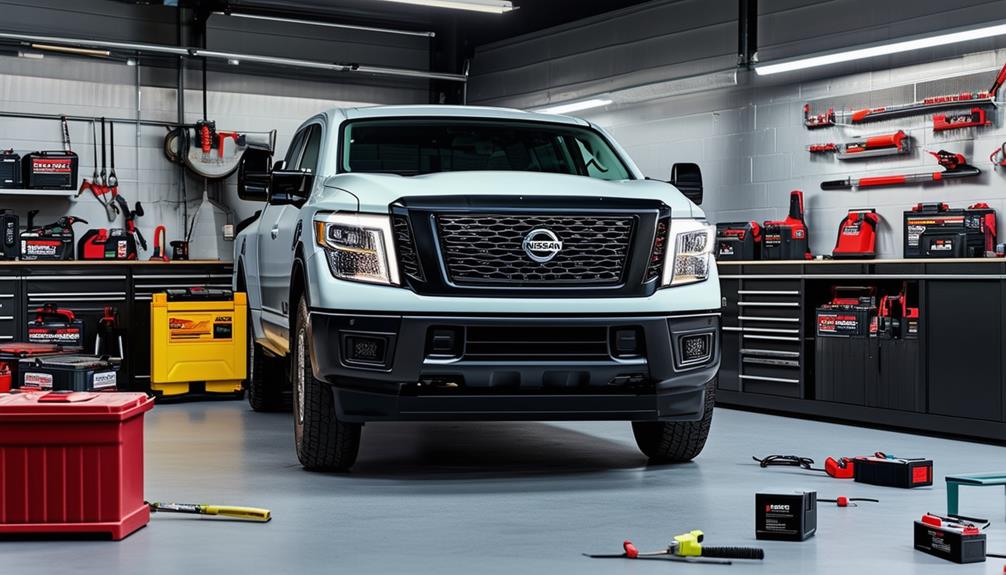
Your Nissan Titan's performance heavily depends on the type of battery you choose. To guarantee top-notch performance and longevity, selecting a battery that meets specific criteria is essential. Titan compatibility is key, so focus on batteries designed to fit seamlessly with your vehicle's electrical system. Additionally, consider the importance of professional maintenance for maintaining vehicle security alongside the right battery choice.
First, consider the voltage requirements. The Nissan Titan typically requires a 12-volt battery. Ensuring the voltage is accurate is vital for the smooth operation of your vehicle's electronics and engine start-up. Incorrect voltage can lead to reduced battery lifespan and potential damage to your vehicle's electrical components.
Next, pay attention to battery longevity. Opt for batteries known for their durability and extended service life. AGM (Absorbent Glass Mat) and Lithium-Ion batteries are excellent choices. AGM batteries offer superior performance under heavy electrical loads and have a longer lifespan compared to traditional flooded batteries.
Lithium-Ion batteries, while more expensive, provide the highest energy density, longest life, and fastest recharge times, making them a cutting-edge choice for those seeking innovation.
Check the cold cranking amps (CCA) rating as well. Higher CCA ratings ensure that your battery can deliver the necessary power to start your engine, especially in demanding conditions. This is important for maintaining consistent performance and avoiding start-up issues.
Lastly, consider the overall build quality and warranty offered by the manufacturer. High-quality batteries usually come with extensive warranties, reflecting their reliability and expected lifespan.
Impact of Cold Weather on Battery Performance
Selecting the right battery is just one part of ensuring your Nissan Titan performs at its best. Cold weather impacts battery performance, and understanding how to mitigate these effects is essential for maintaining battery longevity.
When temperatures drop, the chemical reactions within your battery slow down, reducing its capacity to hold a charge. This means your Nissan Titan might struggle to start or experience electrical issues. To combat this, you need to take specific cold weather precautions.
Here's a concise table to help you understand the impact of cold weather on battery performance:
| Temperature (°F) | Battery Capacity (%) | Required Cold Cranking Amps (CCA) |
|---|---|---|
| 80°F | 100% | 100% |
| 32°F | 80% | 125% |
| 0°F | 60% | 150% |
| -20°F | 40% | 200% |
| -40°F | 20% | 250% |
As you can see, battery capacity decreases as temperatures plummet, requiring higher Cold Cranking Amps (CCA) to start your vehicle. To optimize your battery's longevity and performance during winter, consider these steps:
- Regularly Test Your Battery: Use a battery tester to check its health and voltage.
- Insulate Your Battery: Battery blankets and insulation kits help maintain ideal temperature.
- Minimize Electrical Usage: Turn off non-essential electronics to reduce strain on the battery.
- Keep it Charged: A fully charged battery resists freezing better than a partially charged one.
- Park Indoors: Whenever possible, park in a garage to shield your vehicle from extreme cold.
Battery Maintenance Tips for Optimal Performance
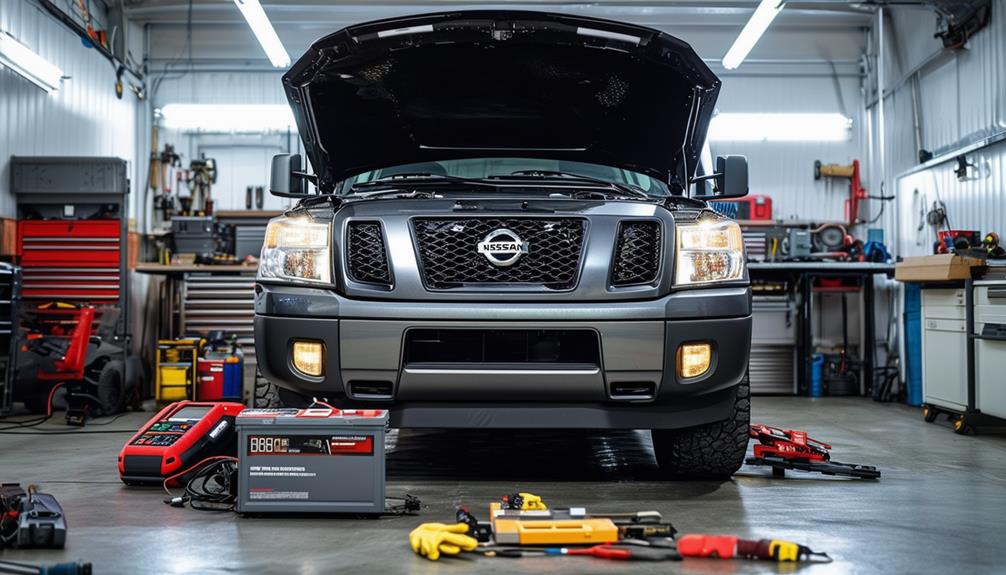
How can you sustain your Nissan Titan's battery stays in top shape year-round? Implementing a few preventive measures guarantees your battery's best performance and extends its lifespan.
First, regularly inspect the battery terminals for corrosion. Corrosion can hinder the electrical connection. Clean the terminals using a mixture of baking soda and water, applied with a wire brush. Rinse with water and dry thoroughly to prevent moisture buildup. For additional security, consider reviewing potential vulnerabilities in your vehicle's system that could affect overall performance.
Next, check the battery's charge level monthly. Use a voltmeter to verify it reads between 12.4 and 12.7 volts when fully charged. If the voltage dips below this range, recharge your battery promptly. A trickle charger can be a good investment for maintaining charge during periods of low vehicle use.
Ensuring your battery is securely mounted is essential. A loose battery can cause vibrations that may lead to internal damage. Confirm the mounting brackets are tight and the battery is stable.
Monitor electrolyte levels, if applicable. Some batteries require distilled water to be added periodically. Confirm the water level covers the internal plates but avoid overfilling. Always wear protective gear when handling battery electrolytes.
Maintain a clean battery casing. Dirt and grime can cause the battery to self-discharge. Wipe the casing with a damp cloth periodically.
Lastly, avoid short trips. Frequent short drives don't allow the battery to fully recharge, reducing battery longevity. Combine errands or take longer drives to keep the battery in peak condition.
Signs of a Failing Battery in Nissan Titan
Wondering how to spot if your Nissan Titan's battery is on its last legs? Recognizing early warning signs can save you from unexpected breakdowns and costly repairs. Here are some key indicators and troubleshooting tips to keep your Titan running smoothly.
First, pay attention to the engine's crank. If it's slow to start or makes a clicking noise, your battery might be struggling to provide enough power. Another telltale sign is dimming headlights. When your battery is failing, it can't supply the consistent voltage needed, resulting in fluctuating light intensity. Additionally, look for dashboard warning lights. Modern vehicles, including the Nissan Titan, often have a battery warning light that illuminates when there's an issue.
For a clearer understanding, here's a quick reference table:
| Warning Signs | Description | Troubleshooting Tips |
|---|---|---|
| Slow Engine Crank | Engine takes longer to start | Check battery voltage |
| Dimming Headlights | Lights flicker or dim unexpectedly | Inspect battery connections |
| Dashboard Warning Light | Battery indicator is on | Test battery with a multimeter |
You should also keep an eye on the battery's age. Most car batteries last between 3 to 5 years. If yours is approaching this range, it's prudent to test it regularly. Corrosion on the battery terminals is another red flag. Corrosion can hinder the battery's performance and lead to electrical issues.
Impact of Battery on Key Fob Functionality
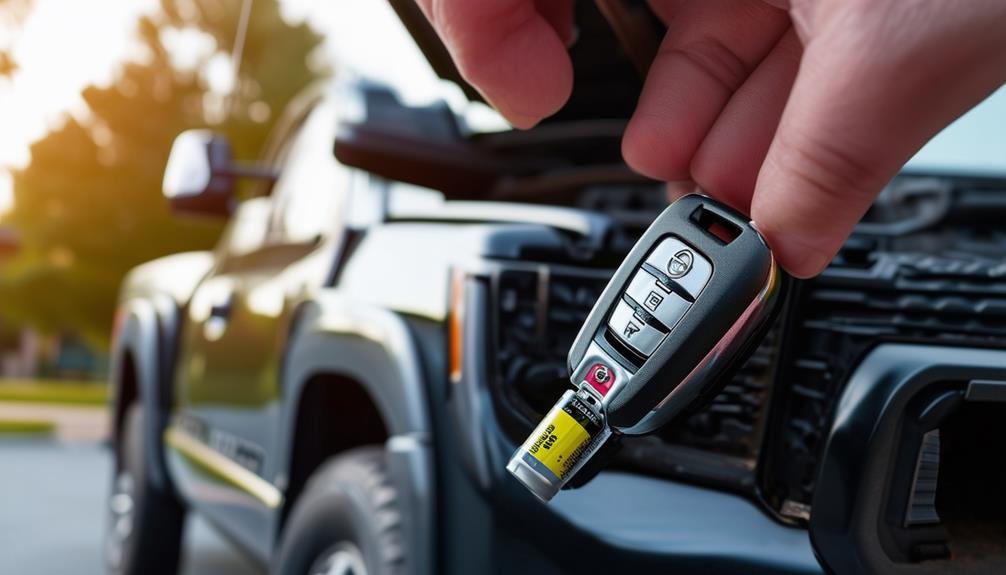
Over time, the performance of your Nissan Titan's battery can directly affect the functionality of your key fob. A weakening battery can lead to inconsistent or completely failed communication between your key fob and the vehicle. To maintain the innovative features of your Nissan Titan, you need to ensure that the battery is in top condition.
First, recognize the signs of a failing battery, as they're often subtle but critical. If your key fob is sluggish or requires multiple attempts to lock or open the doors, it's a clear indicator that the main battery's performance is declining.
You should prioritize key fob troubleshooting by checking the battery's voltage and ensuring it hasn't dropped below the manufacturer's recommended levels.
Nissan Titan's key fob relies on a constant and stable electrical supply. When the battery's lifespan nears its end, the voltage can fluctuate, leading to erratic key fob functionality. You might notice reduced range or complete failure in transmission. To avoid these issues, regularly test your battery's health using a multimeter. This ensures early detection of potential problems.
Additionally, ensure that all battery connections are clean and secure. Corroded or loose terminals can impede the electrical flow, exacerbating key fob issues. Clean the terminals and tighten any loose connections to maintain peak performance.
Lastly, considering the impact of the battery on your key fob, it's wise to replace the vehicle's battery before it entirely fails. Proactive maintenance not only extends the battery's lifespan but also guarantees seamless key fob operation, keeping your Nissan Titan's innovative features readily accessible. By following these steps, you'll maintain the high performance and reliability that you expect from your vehicle.
Long-Term Battery Care and Storage Tips
Proper long-term care and storage of your Nissan Titan's battery helps it stay in peak condition, ready for action when needed. Begin by fully charging the battery before storing your vehicle. Regular battery charging during storage is vital to prevent it from discharging completely, which can lead to sulfation and irreversible damage. Consider checking the warranty and insurance coverage options for battery replacement to save on unexpected costs.
Store your Nissan Titan in a cool, dry place to minimize the effects of temperature fluctuations. Extreme temperatures can impact battery performance and lifespan. If possible, detach the battery from the vehicle to eliminate any parasitic drain. Clean the battery terminals and apply a light coat of petroleum jelly or a specialized terminal protectant to prevent corrosion.
For maintenance, prevention of battery degradation is essential. Invest in a quality battery maintainer or trickle charger. These devices ensure the battery remains at an ideal charge level without overcharging.
Periodically check the battery's voltage using a multimeter. A healthy battery should read between 12.4 and 12.7 volts when fully charged.
If you're storing your Nissan Titan for an extended period, consider removing the battery and placing it on a non-conductive surface. Avoid placing it directly on concrete, as this can cause the battery to discharge faster. Use a battery storage box if available for added protection.
Remember to inspect the battery for any signs of damage or leaks before reinstalling it. Regular inspection and maintenance can prevent unexpected failures and extend the battery's lifespan. By following these battery charging, storage, and maintenance tips, you optimize your Nissan Titan to be always ready to hit the road when you are.
Frequently Asked Questions
How Often Should I Schedule Professional Battery Inspections for My Nissan Titan?
You should schedule professional battery inspections every six months to guarantee peak battery lifespan and maintenance. Combine this with regular DIY battery checks to stay ahead of potential issues and maintain your Nissan Titan's performance.
Are There Any Aftermarket Batteries That Void the Nissan Titan Warranty?
Think of your warranty as a protective shield. If you install aftermarket batteries, you risk compromising battery performance and voiding your warranty coverage. Always check with Nissan if you're considering an upgrade for innovation's sake.
What Are the Signs of Battery Acid Leakage in a Nissan Titan?
You'll notice battery acid leakage by spotting crusty white or blue residue around terminals. Immediate acid cleanup is essential. For corrosion prevention, regularly inspect and clean terminals, and consider using anti-corrosion sprays or protective coatings.
Can I Use a Trickle Charger on My Nissan Titan Battery?
"A stitch in time saves nine." Yes, you can use a trickle charger on your Nissan Titan battery. Trickle charging enhances battery longevity and is an essential aspect of battery maintenance, ensuring your vehicle's best performance.
How Do I Safely Dispose of an Old Nissan Titan Battery?
To safely dispose of your old Nissan Titan battery, explore recycling options at local auto parts stores or recycling centers. Proper disposal minimizes environmental impact. Don't forget to follow any specific local regulations for battery recycling.
Conclusion
Maintaining your Nissan Titan's battery is important for ensuring reliable performance. By regularly checking and replacing the battery, you'll prevent issues that could affect key systems and key fob functionality. Use compatible battery types and follow maintenance tips for best results. If you notice signs of a failing battery, address them promptly to avoid disruptions. Long-term care and proper storage will extend your battery's lifespan, keeping your Titan running smoothly for years to come.

